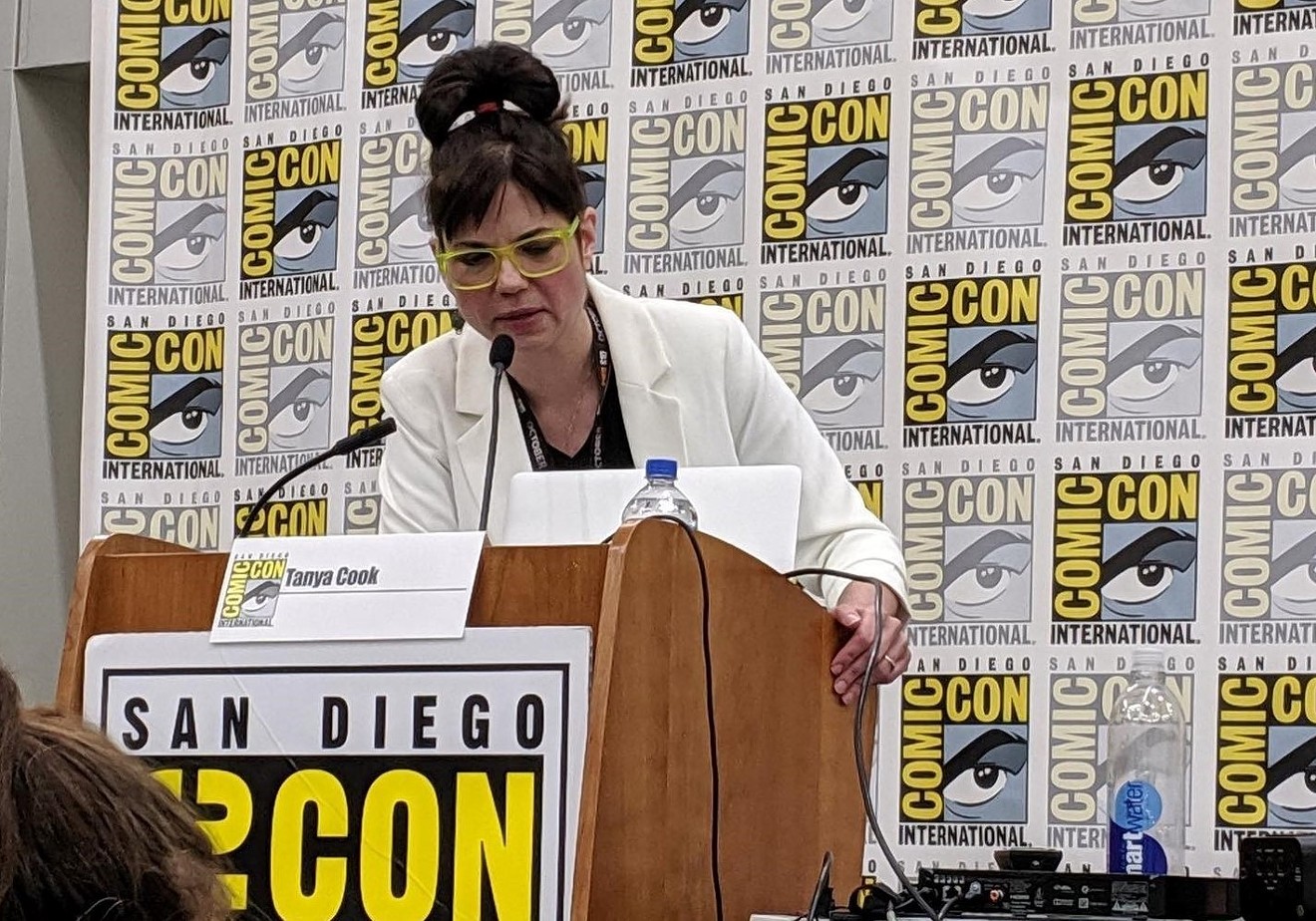Fans can be brutal. They defend the franchises they love — music, movies, comics, games, whatever — to the end. They will cut you down, call you a wannabe for knowing less than they do. If a series goes in a direction they don’t approve of, they will blister its creator. And God forbid you should ever go public with a criticism of whatever they love: Fans will threaten to take your life.
To outsiders, fandom seems like wasted energy: Really, why devote your life to Captain America when there are actual problems in the world? How much time did you spend playing World of Warcraft last night? Seriously, you’re dressing up like Xena: Warrior Princess — for what?
Maybe for doing some good in the world, says Tanya Cook, a professor of sociology at the Community College of Aurora who just received a $40,000 fellowship from the American Council of Learned Societies and the Andrew W. Mellon Foundation to research fandoms and activism.
These days, fewer and fewer people attend religious services or identify as members of a religion, Cook explains. Participation in civic groups — from the Shriners to political parties — has also gone the way of Velveeta, nickel movies and big-box TV sets. The cynical conclusion goes like this: God’s dead. Too few are voting. People are disconnected. Gen-Xers and millennials have divorced democracy, spirituality and community in exchange for cheap entertainment.
But Cook points to a more hopeful possibility: Maybe people are treating pop culture as a religion — and maybe that’s a good thing.
As a sociologist, she doesn’t consider the finer points of faith and belief in order to understand a religion; instead, she’s obsessed with the social structures that religion offers, the comfort and community it provides. And fandom fever can go well beyond religious fervor, she notes: Some people treat fandoms as religious social movements, using the mythologies from comic books, fantasy novels and TV series to inspire communities that fight for economic, environmental and social justice.
Cook began studying fan cultures after watching the CW series Supernatural with her son and going to a Supernatural convention, where she learned that actors in the show had formed Always Keep Fighting, a group that raises money for mental-health support for people dealing with suicidal thoughts, depression and addiction.
She also joined Supernatural fans in a social-justice-themed scavenger hunt organized by actor Misha Collins and his GISH (Greatest International Scavenger Hunt) project. On the hunt, her team engaged in social actions, including creating signs based on the text under the Statue of Liberty and holding them in front of an immigration detention center. Proceeds from the hunt went to Random Acts, a nonprofit focused on doing good around the world, which was then funding a project to remove active mines and bombs that had been scattered around Laos during the Vietnam War. GISH has also worked on issues involving veterans, Syrian refugees, students and impoverished women.
Fascinated, Cook set out to research whether other fandoms mirrored religious social movements. She spoke with more than forty people obsessed with the Marvel Universe, Star Trek, Harry Potter, Xena: Warrior Princess and even the ’60s band The Monkees to determine how they connected to the pop-cultural phenomenon, and whether they formed communities and used their fandom to organize politically, socially or culturally.
Turns out, many fandoms are quite active — some through actions organized by fans themselves, and others following the lead of celebrities.
Cook points to the Harry Potter Alliance, a fan-led activist group founded in 2005 that has a specific mission: “Turning Fans Into Heroes.” The nonprofit runs a Wizard Activist School where people join “Dumbledore’s Army,” learning leadership and organizing skills.
Cook participated in the group’s Granger Leadership Academy, named after the bookish and endlessly correct Hermione Granger from the Harry Potter series, who managed to use magic to take multiple classes at one time while maintaining her friendships and fighting evil. That academy, which is gender-inclusive, girl-power centered and open to anyone between ten and sixty, teaches people to become empowered leaders.
But the Alliance’s interests span far beyond the Harry Potter world. The organization created a curriculum called Fandom Forward that offers various groups of fans – of Pokémon, Black Panther, Voltron, Doctor Who, Avatar and more — instructions on how to put their communities’ obsessions to work for progressive causes. Related workbooks tackle issues from colonialism and racism to environmental advocacy, gender identity and media censorship.
While the Alliance focuses on millennials and younger people, Cook also studied such Gen X groups as the Xenite Retreat, a gathering of Xena: Warrior Princess fans that she likens to a summer-camp experience for adults — only without the bullies.
There, along with other attendees who grew up looking to Xena and her crew of warrior women as role models, Cook found a safe space. Among fellow Xenites, she was free from the pressures of academic hierarchies, motherhood and competition-riddled social scenarios that shaped her day-to-day life and could explore her true self — even taking a stab at standup comedy, something she had long wanted yet feared to do.
Through the interviews she conducted at various pop-culture gatherings — including the Denver Pop Culture Con, run by Pop Culture Classroom, a nonprofit in town that uses comic culture to promote literacy — Cook learned that her experiences were not unique. With fellow fans, others were finding profound meaning, empowerment and inspiration to make the world a better place.
Now, in collaboration with her partner, psychologist Kaela Joseph, Cook has started writing about her experiences on a Medium.com blog titled "FandomsAsSocMvmts." And she's continuing to do research, using money from the fellowship to have dozens of interviews transcribed and to travel to sci-fi, fantasy and comics conventions. Ultimately, she wants to write an optimistic book about fans and activism. The project’s name: “Always Keep Nerd Fighting: Fandoms as Social Movements.”
Balancing all of this research and writing with teaching five community-college classes per semester has been quite a juggling act, Cook says.
How does she do it?
Her answer: “I am Hermione Granger.”
Correction, August 14, 2019: An earlier version of this story identified Always Keep Fighting as a nonprofit. It is not.
[
{
"name": "Air - MediumRectangle - Inline Content - Mobile Display Size",
"component": "12017618",
"insertPoint": "2",
"requiredCountToDisplay": "2"
},{
"name": "Editor Picks",
"component": "17242653",
"insertPoint": "4",
"requiredCountToDisplay": "1"
},{
"name": "Inline Links",
"component": "18838239",
"insertPoint": "8th",
"startingPoint": 8,
"requiredCountToDisplay": "7",
"maxInsertions": 25
},{
"name": "Air - MediumRectangle - Combo - Inline Content",
"component": "17261320",
"insertPoint": "8th",
"startingPoint": 8,
"requiredCountToDisplay": "7",
"maxInsertions": 25
},{
"name": "Inline Links",
"component": "18838239",
"insertPoint": "8th",
"startingPoint": 12,
"requiredCountToDisplay": "11",
"maxInsertions": 25
},{
"name": "Air - Leaderboard Tower - Combo - Inline Content",
"component": "17261321",
"insertPoint": "8th",
"startingPoint": 12,
"requiredCountToDisplay": "11",
"maxInsertions": 25
}
]












